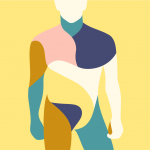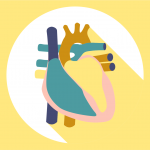Hypertrophic Cardiomyopathy (HCM)
This in-depth guide to Hypertrophic Cardiomyopathy (HCM), a disease that can make it harder for the heart to pump blood, offers insights on the latest research from leading doctors in the field.
Explore popular hypertrophic cardiomyopathy (HCM) articles and topics
Understanding HCM
Explore popular hypertrophic cardiomyopathy (HCM) articles and topics
Living With HCM
Inspiring Stories for Those Living With This Often Hidden Disease
Dr. Philip Weintraub explains how HCM is diagnosed.
Diagnosing HCM
Dr. Philip Weintraub, a cardiology specialist based in New York, explained that HCM diagnosis will depend on the results of several tests, which may include:
- Health history survey
- Complete physical exam
- Electrocarodiogram
- Echardiogram
Once a diagnosis is made, you and your doctor can work together to come up with a plan that works to stop the disease from progressing.
“Hypertrophic cardiomyopathy, when not diagnosed and not treated, carries a high incidence of sudden death,” Dr. Weintraub explained. “So therefore, one likes to make the diagnosis of a cardiomyopathy secondary to hypertrophic factors because there are things that could be done to prevent its progression and to of course, prevent sudden death.”
Exploring Treatment Options
How HCM is treated depends a lot on the individual patient and the severity of the disease. In some instances, simple lifestyle modifications may be sufficient, while in others, beta blockers (drugs used to manage abnormal heart rhythms) or pacemakers (devices that help the heart to pump blood) may be required.
“In some cases, one can use lifestyle modification in those that are asymptomatic or less symptomatic … in more severe cases, one needs to bring in an arsenal of medications”
– Dr. Philip Weintraub
Medications
In more severe cases of HCM, drugs called beta blockers may be used, Dr. Weintraub explained.
“In the past, we've use beta blockers, [which] are drugs that block adrenaline from the body, with the thought process being that if you could decrease the contractility of the left ventricle, you will decrease the amount of obstruction that occurs when the blood is being pumped out of the heart,” he said.
Dr. Weintraub also pointed to another type of drug called negative inotropes, which can be used to decrease the workload of the heart.
"The theory behind them is that if you could make the heart function at a decreased rate, then you're going to wind up with less obstruction.”
Dr. Philip Weintraub explains which medications can be used to treat HCM.
Surgical Options
Another option is to implant something called a pacemaker, a device that can help the heart to pump blood.
Pacemakers "reside on the right side of the heart [and] will force the septum to move with the right side of the heart," Dr. Weintraub explained. "So, there's less interference with the contractility and the ejection of the blood from the left ventricle."
Your doctor may also recommend something called alcohol septal ablation, which can be used to thin the heart's thickened septum. "The belief is that the alcohol will cause the heart muscle to die," Dr. Weintraub explained. "So it won't be allowed to express itself in the outflow tract."
Another surgical options is called a septal myectomy, which is meant to thin out the wall between the left and right side of the heart. "You'd have to surgically enter the left ventricle and carve out the area of the ventricle that's causing this particular problem," Dr. Weintraub explained.
New Treatments
In April 2022, the Food and Drug Administration (FDA) approved a new treatment called mavacamten for people with certain types of obstructive HCM.
"Mavacamten is an agent that will reprogram the muscle fibers of the heart," according to Dr. Weintraub. "These are the muscle fibers, and they will downscale them to the point where they don't produce as much muscle, which is contrary to what is necessary and what develops in hypertrophic cardiomyopathy.
"The drug has been studied and it appears to be quite effective in improving the quality of life where people who have experienced heart failure generally can move to a lower class in terms of how symptomatic they are."
Dr. Weintraub discusses lifestyle adjustments that can help those with HCM.
Living With HCM
Implementing a series of healthy habits after a hypertrophic cardiomyopathy is important for all patients, but these changes may look different for different people.
Dr. Weintraub suggested prioritizing habits, such as:
- Moderate exercise
- Avoiding isometrics exercises like weight lifting
- Maintaining weight
- Getting on a healthy sleep schedule
- Discussing/managing stress
- Avoiding substances that put strain on the heart
“You want to [stay] at a healthy weight,” he added. “You don’t want to put more strain on an overstrained system by allowing obesity to settle in. Sleep is [also] very important. Sleep must be obtained because people who don’t sleep well and develop sleep apnea compromise their general health.”
A heart healthy diet includes a variety of fruits, vegetables, whole grains, and lean meats and fish. A diet low in animal fat may also be helpful, since it may reduce cholesterol.
Dr. Dwivedi, told SurvivorNet that finding the right exercise routine is also important when taking care of heart health.
“It’s also important that you remain active, which means moderate activity” Dr. Dwivedi said. “A lot of patients with hypertrophic cardiomyopathy are restricted from doing strenuous activity because it can actually make their condition worse, but it’s important to still stay active and [patients] can consider a supervised exercise program to remain active as well.”

Please confirm you are a US based health care provider:
Yes, I am a health care Provider No, I am not a health care providerSign Up Now.
Take Control of Your Disease Journey.
Sign up now for expert patient guides, personalized treatment options, and cutting-edge insights that can help you push for the best care plan.







